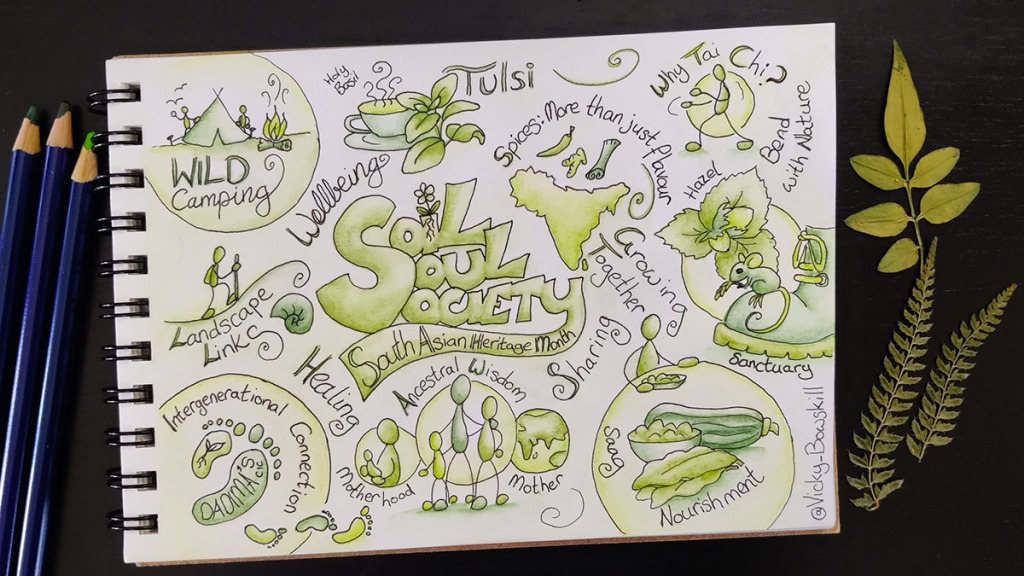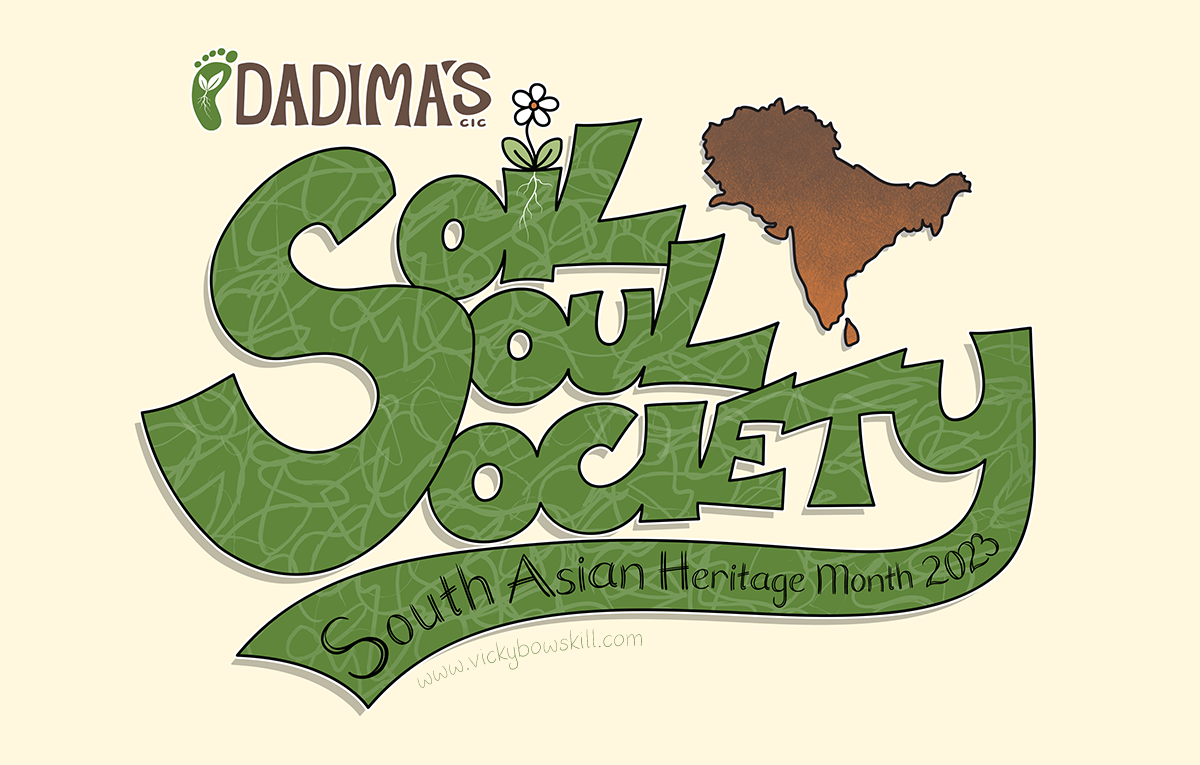Time in nature offers a host of health and wellbeing benefits but green spaces in the UK are not equally welcoming for everyone. Barriers may be physical, cultural, educational – and all too often, invisible. Dadima’s CIC is a community walking group in the Chilterns, created by Geeta and Subash Ludhra to provide a welcoming space for people in the South Asian community to connect with nature. But it is so much more than that. In this blog I reflect on my experience at the Dadima’s South Asian Heritage Month event titled ‘Soil, Soul, Society’, which I attended with my trusty sketchbook on 16 July 2023.

This cultural storytelling extravaganza took place at the Chilterns Open Air Museum in a historic barn, filled with straw bales, Asian cuisine and a diverse group of fabulous humans. Speakers shared their personal stories about time in nature and what it means to them. We heard about wild camping, hiking and community allotments. Landscape links were illustrated through geology and the spice trade. Spiritual connection was flavoured by tulsi and tai chi. The shared heritage and cultural significance of these things generated many knowing smiles and thoughtful nodding as friends old and new recognised themselves in others and discovered new perspectives.
The opportunity for this kind of open dialogue is an important part of creating and strengthening a sense of community amongst people who are too often a minority in our green spaces. But inclusion, true inclusion, is about so much more than the mere absence of active exclusion and Geeta highlighted this; Dadima’s does not exclude anyone. For me, two speakers in particular demonstrated this beautifully.
Firstly, a wonderful young man named Rayhan stepped cautiously up to the mic to introduce his mother. That would be impressive for any young person, but this super star had only recently overcome his speech barriers and found his voice – and this was the first time he shared his voice in front of a group. I’m sure everyone was touched by this; I certainly was. You see, I am autistic and my voice and I have also had a chequered history. I was speaking in sentences before I was one year old, but also experienced confusing non-verbal periods – and still do sometimes. Navigating atypical verbal functioning is deeply misunderstood and poorly tolerated in life. Sitting in a dark corner at the back of the barn with doodling pencil poised, I found myself quite choked witnessing this brave young person share his voice. Respect.
The final speaker of the day was Duncan, a kind nature-friendly farmer who hosts groups of children with special learning needs at Countryways care farm, providing safe access to all the valuable skills and experiences that a farm can offer. And Duncan is also autistic. He shared a poignant story about his autism and the refuge he has found in nature whilst his son stood by for moral support, ready to take over if Duncan was unable to continue. But continue he did, despite the emotions evoked by his reflections. I again found myself feeling deeply moved by the courage Duncan showed in sharing his personal story. This was another talk that resonated strongly for me, having also found solace in a hostile world amongst foliage, fur and feathers.
All the speakers brought something special and the energy and sense of community in that barn was palpable. For me, Dadima’s is an excellent model of authentic inclusion and to create that I think it takes people who have lived experience of being othered by a system that is not designed for them. It’s not enough to simply state that you are inclusive in the small print – something too many organisations do. You need to walk the talk, to actively include people in words and in deeds. An important part of that is providing space for people to talk (or not), to listen respectfully and to understand the barriers and the common ground that exist between them. To be themselves. The voluntary contributions from vulnerable voices is testament to how effectively Dadima’s does this.
My perspective on inclusion has primarily been one of invisible disability but I recognise the benefits I’ve had in being able to hide behind my whiteness. I have certainly learned a lot about cultural inclusion through Dadima’s that I hadn’t really understood previously. And I have personally felt more included in this warm and diverse space than I have in many other groups I’ve navigated over the years.
People-ing is a challenge for any autistic person and I often avoid group events but I’m grateful to have been welcomed so effortlessly into the Dadima’s space. I’m sure everyone took away their own personal reflections and memories from the day, enriched by the experience. The power of diversity in creating inclusive green spaces cannot be underestimated. Thank you, Dadima’s!
Find out more
You can find full details of Dadima’s events at www.chilternsaonb.org/events/dadimas-cic-walking-group-2023-programme
Find out more about South Asian Heritage Month at southasianheritage.org.uk
Find out more about autism at www.autism.org.uk
Look out for the video and eBook of this event coming soon…


What a lovely blog Vicky, thanks so much, it was an amazing event.
LikeLike
Thanks! It was lovely to see you there 🙂
LikeLike
I’m working on my blog now, to get something out before end of SAHM, but I think yours is really good and I can’t emulate it.
LikeLike
You always write lovely blogs. Different perspectives are always interesting – I look forward to reading yours 🙂
LikeLiked by 1 person